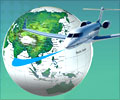Better known for its white sands and smiles, Thai tourism is taking a battering as the latest gruesome protests in Bangkok have frightened off visitors to the kingdom.
Would-be tourists considering massage, temples and spicy food in the Thai capital this week may have been put off by scenes, televised worldwide, of red-clad protesters throwing bottles of their own blood at government offices.The so-called Red Shirts, supporters of former prime minister Thaksin Shinawatra, are trying to force snap elections.
And although their rally has been peaceful so far, many recall the Red Shirts' protests last year that turned violent and came months after airport blockades by the rival Yellow Shirts that left tens of thousands of visitors stranded.
Thai travel agents' representative Surapol Sritrakul said the crimson protests had led to many tour cancellations, particularly in key Asian markets, estimating that tourism figures were down 20-30 percent on the yearly average.
"Blood is scary. Many people think the protests could be violent. They think the blood could come from killing. It's not a good image for Thailand," said Surapol, president of the Association of Thai Travel Agents.
Thailand's tourism authority said 38 countries had issued travel warnings for Bangkok over the rally that began last weekend.
Advertisement
The rival red and yellow protest groups have taken to the streets repeatedly, causing insecurity among tourism officials who say they see a gradual erosion of Thailand's reputation as the "Land of 1,000 Smiles".
Advertisement
Last April the Reds, most from the country's poor, forced the early closure of a key Asian summit and caused riots in Bangkok that left two dead and scores injured and only ended when troops hit the streets.
"The tolerance of tourists is decreasing. They worry they will be blocked again, that they will face problems. It is always a matter of security. I think it's really negative in the long term," said the marketing director of an international hotel brand, who refused to be named.
April is the month of Songkran, a water festival that celebrates the Thai new year and usually attracts thousands of tourists to the country. But this year, bookings are down.
"We have lost 25 million baht (780,000 dollars) since March 11, but what worries me are the bookings for April... things are quiet," he said.
The picture on Thailand's stunning palm-fringed beaches is not so bleak in the short term, said Bill Barnett, a Thai media columnist on tourism who runs a consulting firm based on the southern tourist isle of Phuket.
Barnett said many people were opting to avoid Bangkok and rerouting their flights to Phuket at the last minute to catch some sun amid peace and quiet.
But longer term prospects were less rosy, he said, hit not only by political turmoil, but also health fears over the 2003 SARS outbreak and safety concerns after the Asian tsunami in 2004 that left 5,395 people dead in Thailand.
"In the long term there will be damage. Tourist figures usually follow a cyclical pattern but here it's a lot more volatile -- instead of peaks and valleys it looks like an ECG machine after a heart attack."
Source-AFP
TRI











